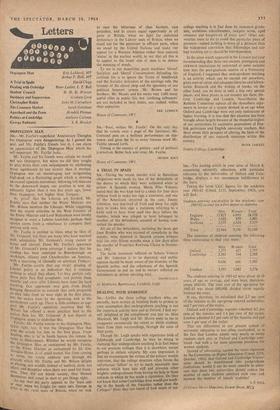SIR,—Unlike the three college teachers who, ex- pectedly, have written
in bristling haste to protest at your assumption that undergraduate teaching is not the important activity here and at Oxford, I find my- self delighted at the compliment you pay us. Miss Murdoch, Mr. Leigh and Mr. Moore seem to me to exaggerate enormously the extent to which students learn from their surroundings, through the seats of their pants.
Though Mr. Leigh speaks with experience both of Edinburgh and Cambridge, he may be wrong, in claiming that undergraduate teaching is in fact better in our precious colleges than it is elsewhere, except perhaps in certain subjects. My own impression is that we overestimate the virtues of the solitary weekly interview, that the college structure often forces the unfortunate 'fellow' to try to teach unsuitable men subjects which bore him stiff and prevents other brighter undergraduates from having his help in those subjects in which he has made a reputation. Do they not know that some Cambridge dons would put teach- ing in the hands of the Faculties rather than the Colleges? Have they not heard of how much of our college teaching is in fact done by immature gradu- ates, ambitious schoolmasters, indigent wives, aged retainers and hangers-on of every sort? Other uni- versities seem to me to avoid this particular piece of pretence—indeed nothing is more of a delusion than the widespread conviction that fellowships and col- lege teaching are or should be interdependent.
In the piece which appeared in the Listener last year recommending that these two ancient, prestigious and awkward institutions be converted at some suitable time into the post-graduate centres of a University of England, 1 suggested that undergraduate teaching is an activity which can be carried out anywhere, given men of talent and adequate libraries and labora- tories. Research and the writing of books, on the other hand, can be done at only a few very special places, and these places in our country are three, Ox- ford, Cambridge and London. Nevertheless the Robbins Committee repeats all the threadbare argu- ments in favour of a system devised in an age when Oxford and Cambridge were our only institutions of higher learning. It is true that this situation has been brought about largely because of the shameful neglect of our universities by successive generations of Eng- lish politicians and English university teachers. But there seems little prospect of altering the facts of the distribution of our research resources within this century.
PETER LASLETT Trinity College, Cambridge








































 Previous page
Previous page